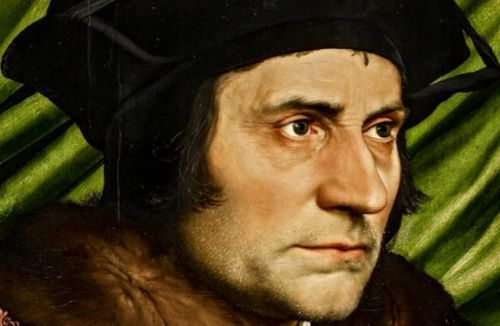The Catholic Philosopher Who Chose Death Over Compromise
Feb 08, 2023 · 2 mins read
0
Share

Thomas More was the most powerful lawyer in Britain, the King's personal advisor, Shakespeare's inspiration, and the writer of the world's first Utopian novel in 1516. EXECUTED as a traitor in 1535. Only to be made a saint in 1935. Here's the story of a man who died for an idea:
Save
Share
In his lifetime Thomas More was a knight, a sheriff, a treasurer, Speaker of the House Of Commons, famous writer, and Lord Chancellor (technically a higher post than the PM). But his deep religious conviction led to a (fatal) rift with Henry VIII.
Save
Share
Decades before his beheading, Thomas More invented the genre of Utopia. He wrote of an island society with security, justice, educated citizenry, free healthcare, social safety nets, & (shockingly) progressive laws. Was More the first communist? Many hints throughout say NO.
Save
Share
Thomas More called his egalitarian paradise UTOPIA, which is Greek for "no where." Its main river is Anydrus, which means "no water." Their king: Ademus, meaning "no people." The man who found the island is called Hythlodaeus, meaning "speaker of nonsense." UTOPIA IS A PHANTOM.
Save
Share
In More's Utopia: Private property is abolished, all houses identical, doors never locked, lunch eaten in communal halls, and the workday is just 6 hours. People also wear identical clothes and privacy is a crime
In very FIRST literary Utopia, perfection's price = conformity.
Save
Share
Thomas Moore was a gifted scholar and coined many words we use everyday:
• Aloof
• Chat
• Exact
• Invite
• Anxiety
• Monopoly
• Alternate
• Banker
• Paradox
• Old Order
Save
Share
In 1532 Moore resigned as Lord Chancellor. As a Catholic, he was against Henry VIII's annulment of his first marriage + his attempts to put the Crown over the Church. More kept his opinion to himself. But when forced to publicly back the King over Pope, he refused on Principle.
Save
Share
More was imprisoned in the Tower of London but there still was a way out. The judge told him he could have the king's pardon if only he gave up his "obstinate opinion." High-ranking officials visited him, begging him to just take an oath backing the King. More didn't budge.
Save
Share
On 6 July 1535, More was led to his execution. Minutes before the swing, Moore said that he "died the king's good servant, and God's first." The executioner begged for forgiveness. More got up, kissed him with a smile, and lay his head down.
Save
Share
More was a renowned intellectual, great writer, and a powerful, supremely connected man. All he had to do to avoid his fate was pay total allegiance to the powers that be. But Moore's total allegiance was to his God only. He gave his life up for his religious conviction.
Save
Share
0